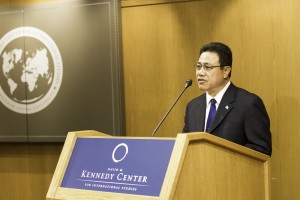
His Excellency Ali’ioaiga Feturi Elisaia, ambassador of Samoa to the United States, insisted that “small can be beautiful” at a Kennedy Center lecture on March 27.
The ambassador described how Samoa is keeping its family-centered culture paramount while learning to act as part of the “global family.” The ambassador described Samoa’s efforts to globalize as part of the ambassadorial lecture series at the Kennedy Center, and his audience included Samoans, returned missionaries from Samoa, and members of Political Science 150.
“I came, I saw, I didn’t conquer, but I fell in love with the Kennedy Center and you people here today,” Elisaia said.
The ambassador explained that the basic unit of Samoan society is the family, not the individual. The constitution of Samoa guarantees religious freedom, but it is ultimately a country “founded on God,” as well as love, humility and forgiveness.
International relations major Ryan Madsen attended the lecture at the urging of a roommate who served a mission in Samoa. However, he also enjoyed a similar culture while serving in Indonesia.
“The people there are focused on family,” Madsen said. “They’ve invited BYU professors over there to implement family enrichment programs.”
In the past new churches could not be established in Samoa if there was already a Methodist church in the area. However, the constitution safeguards freedom of worship, and Elisaia explained that this has allowed The Church of Jesus Christ of Latter-day Saints to become strong in Samoa.
“Sometimes it’s a strength to have many different religions so long as you are all worshiping the same God and there is a level of accountability between you and God,” Elisaia said.
The state of Samoa has opted to keep these foundational tenets but has also tried to make several changes in the name of globalization. The nation erased December 30, 2011, from the Samoan calendar in order to put the nation on the other side of the International Dateline.
“Samoa went from being the last country to ring in the new year to the first,” Elisaia said.
The drivers of Samoa switched from driving on the left side of the road to the right to save money on expensive left-side equipment. The switch involved a two-day holiday and a three-day ban on alcohol sales, but it went smoothly. Samoa also began celebrating its independence day in June rather than January in 1963.
“It’s the sunny period, and not much happens in this month anyway,” Elisaia said.
Some lecture attendees were returned missionaries who had served in Samoa in the midst of many of these changes, so they were particularly interested. They agreed with the ambassador’s claim that Samoa is a family-centered environment where the Church is fairly strong.
“The Church has about 30 percent members in Samoa,” said Hayden Carl, an economics major who served his mission in Samoa.
Another student who served his mission in Samoa jokingly complained that a day was forever erased from his life when Samoa made the change to be on the other side of the International Dateline.
The ambassador urged those interested to visit the small but beautiful islands of Samoa, even though the difficulty of travelling there can dissuade all but the most dedicated of visitors.
“We are looking for quality tourists,” Elisaia said.




